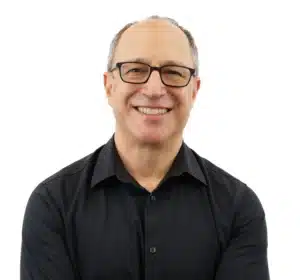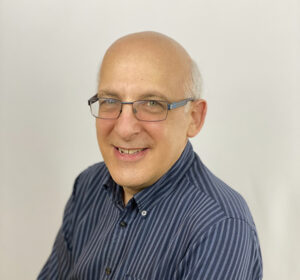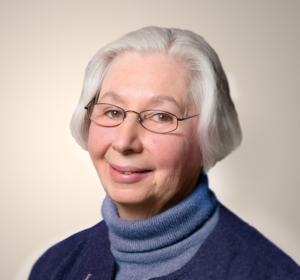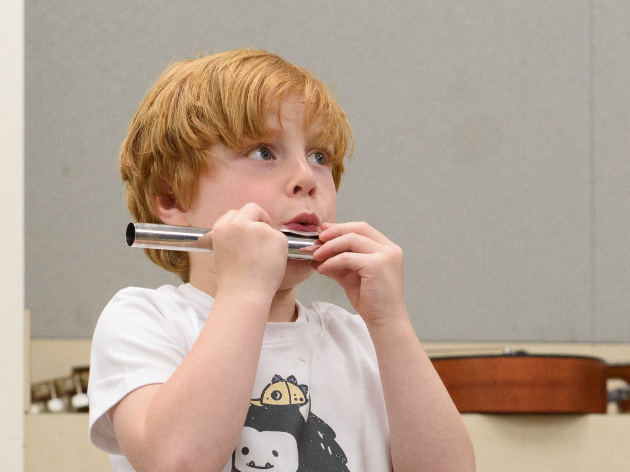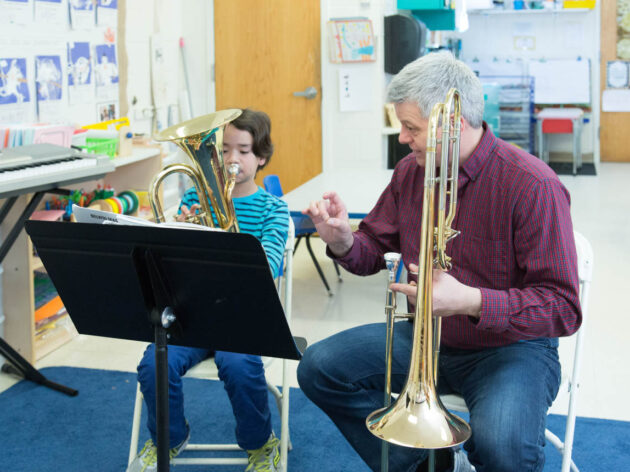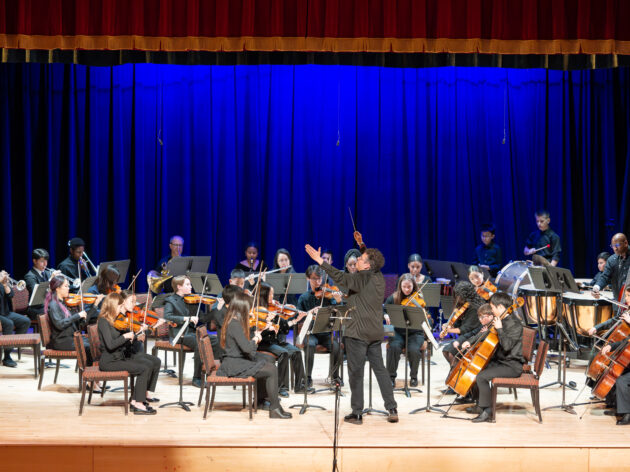
Instrumental group classes for private-lesson students are a key component of instrumental instruction and provide an outstanding ensemble and social experience for our students.
For students taking private music lessons, the Thurnauer School of Music offers a variety of classes designed to enhance students’ understanding and enjoyment of music. We offer instrumental groups in violin, flute, cello, clarinet, piano, oboe, and guitar.
For information, please call 201.408.1466.



Instrumental Group Classes
Instrumental group classes for private-lesson students are a key component of instrumental instruction. The Suzuki approach is used for violin, cello, flute, and guitar. We also offer groups in clarinet, percussion, piano, and saxophone. Concurrent private lessons, either at the Thurnauer School or elsewhere, are required. Group classes should not be taken on their own as introductory classes.

Cello Group Beginners – Yo-Yo Ma
Ages: 4-7 Year Olds
Using the Suzuki Method pieces in the cello volumes and musical games, students focus on ear training, rhythm, and basic techniques such as bowing and finger placement. Classes emphasize group learning, fostering a sense of community, and musical enjoyment. The Yo-Yo Ma group class is for beginning cellists who just started learning until they reach about middle Book 1 in Suzuki volume 1. This cello group class supplements students’ fundamentals of cello playing.
Tuesdays from 4:30-5:00 PM (Starts Sept 16)
$875 / JCC Member
$960 / Guest
Cello Group Casals
Ages 6-9 Years Old
Using the Suzuki Method pieces in the cello volumes and musical games, students focus on ear training, rhythm, and basic techniques such as bowing and finger placement. The Casals group class is for advanced-beginning/early-intermediate cellists who are playing at a level of pieces at the end of Suzuki Book 1 and Suzuki Book 2. Classes emphasize group learning, fostering a sense of community, and musical enjoyment.
Tuesdays from 4:30-5:15 PM
30 Classes: Starts Sept 16
$875 / JCC Member
$960 / Guest
Cello Group du Pré
Ages 7-10 Years Old
Using the Suzuki Method pieces in the cello volumes and musical games, students focus on ear training, rhythm, and basic techniques such as bowing and finger placement. Classes emphasize group learning, fostering a sense of community, and musical enjoyment. The du Pré group class is for intermediate cellists who are playing at a level of pieces at the end of Suzuki Book 2 and Suzuki Book 3.
Tuesdays from 5:15-6:00 PM
30 Classes: Starts Sept 16
$875 / JCC Member
$960 / Guest
Clarinet Group
Ages 8+ Years Old
Beginning and intermediate clarinet students grow musically in a supportive group setting – building their skills, improving technique, playing songs confidently, and making new friends. The class focuses on tone production, reading music, articulation, ensemble playing, and musical expression.
Mondays from 5:00-5:45 PM
30 Classes: Starts Sept 15
$875 / JCC Member
$960 / Guest
Flute Group
Ages 5-9 Years Old
For young flutists in Kindergarten through 4th grade who are taking private flute lessons. This fun and supportive group class reinforces essential flute-playing skills and music reading, complementing what students learn in their private lessons. A great way to build confidence and musicality while making friends!
Wednesdays from 5:00-5:45 PM
30 Classes: Starts Sept 17
$875 / JCC Member
$960 / Guest
Guitar Class 1A
Ages 4-8 Years Old
This Suzuki Method group class provides an opportunity for the teacher to put across core values such as rhythmic control, phrasing and dynamics, following a leader, and other important things that are harder to teach in a private setting. Group also creates a peer group motivation for the student and combines group learning about the Suzuki repertoire with a music skills segment in each class that focuses on reading, theory, improvisation and more. Repertoire: Suzuki Book 1.
Mondays from 5:15-6:15 PM
30 Classes: Starts Sept 15
$875 / JCC Member
$960 / Guest
Guitar Class 2/3
Ages 9-15 Years Old
This Suzuki Method group class provides an opportunity for the teacher to put across core values such as rhythmic control, phrasing and dynamics, following a leader, and other important things that are harder to teach in a private setting. Group also creates a peer group motivation for the student and combines group learning about the Suzuki repertoire with a music skills segment in each class that focuses on reading, theory, improvisation and more. Repertoire: Suzuki Books 2-3.
Sundays from 9:00-10:00 AM
30 Classes: Starts Sept 21
$875 / JCC Member
$960 / Guest
Thursdays from 6:45-7:45 PM
30 Classes: Starts Sept 18
$875 / JCC Member
$960 / Guest
Guitar Class 4+
Ages 12+ Years Old
This Suzuki Method group class provides an opportunity for the teacher to put across core values such as rhythmic control, phrasing and dynamics, following a leader, and other important things that are harder to teach in a private setting. Group also creates a peer group motivation for the student and combines group learning about the Suzuki repertoire with a music skills segment in each class that focuses on reading, theory, improvisation and more. Repertoire: Suzuki Book 4 and above.
Mondays from 7:00-8:00 PM
30 Classes: Starts Sept 15
$875 / JCC Member
$960 / Guest
Oboe Group
Ages 8+ Years Old
For intermediate oboe players, this group class offers a collaborative and engaging experience for making music together. Students develop essential listening skills, improve tuning awareness, and learn how to blend and balance within a group—valuable skills for orchestral and chamber music settings. The class explores a diverse repertoire, offering students the opportunity to expand their musical experience while growing as confident, expressive musicians.
Tuesdays from 6:45-7:30 PM
30 Classes: Starts Sept 16
$875 / JCC Member
$960 / Guest
Violin Group 1 Mozart
Ages 4-6 Years Old
Playing together with other violinists is so much fun and an important part of a young musician’s development. They learn by listening to and watching others, as well as reviewing old pieces and learning new ones. We cover Suzuki repertoire (Pre-Twinkle to “Lightly Row”), try improvisation, and play musical games. We also have opportunities to play and perform together.
Mondays from 5:00-5:45 PM
30 Classes: Starts Sept 15
$875 / JCC Member
$960 / Guest
Violin Group 2 Bartok
Ages 5-7 Years Old
Playing together with other violinists is so much fun and an important part of a young musician’s development. They learn by listening to and watching others, as well as reviewing old pieces and learning new ones. We cover Suzuki repertoire (“Song of the Wind” to the end of Suzuki Book 1), try improvisation, and play musical games. We also have opportunities to play and perform together.
Mondays from 5:00-5:45 PM
30 Classes: Starts Sept 15
$875 / JCC Member
$960 / Guest
Violin Group 3 Mendelssohn
Ages 10-14 Years Old
Playing together with other violinists is so much fun and an important part of a young musician’s development. They learn by listening to and watching others, as well as reviewing old pieces and learning new ones. We cover Suzuki repertoire (Suzuki Books 2-3), try improvisation, and play musical games. We also have opportunities to play and perform together.
Thursdays from 5:00-5:45 PM
30 Classes: Starts Sept 18
$875 / JCC Member
$960 / Guest
Violin Group 4 Kreisler
Ages 14+ Years Old
Playing together with other violinists is so much fun and an important part of a young musician’s development. They learn by listening to and watching others, as well as reviewing old pieces and learning new ones. We cover Suzuki repertoire (Suzuki Book 4, two completed Seitz concertos and above), try improvisation, and play musical games. We also have opportunities to play and perform together.
Thursdays from 5:30-6:30 PM
30 Classes: Starts Sept 18
$875 / JCC Member
$960 / Guest
Violin Group for Older Beginners
Ages 9+ Years Old
Learning the violin is an exciting journey at any age, and playing with others makes it even more fun and rewarding. In this group class, older beginners develop their skills alongside peers in a fun and supportive setting. They learn by listening to and watching others, as well as reviewing old pieces and learning new ones. We cover Suzuki repertoire (Suzuki Book 1), try improvisation, and play musical games. We also have opportunities to play and perform together.
Thursdays from 6:00-6:45 PM
30 Classes: Starts Sept 18
$875 / JCC Member
$960 / Guest
Meet the Team
See All JCC StaffFAQs
Why should my child study music?
- In addition to the enormous personal enjoyment music brings, music study helps children learn how to learn.
- Attending lessons and practicing an instrument each day teaches focus, concentration, patience, critical thinking and reflection – skills we use throughout our lives.
- Studies have shown that “students engaged in music programs outperformed their peers on every indicator: grade-point average, graduation rate, ACT scores, attendance and discipline referrals.”
- KU research establishes link between music education and academic achievement
Why should my child study at the JCC
Thurnauer School of Music?
- A school environment creates a community of musicians who inspire, motivate and befriend each other.
- Students benefit musically and psychologically from the expertise of our excellent faculty, the School’s warm, nurturing atmosphere and the experience of hearing other students make music at different levels of musical development.
- The Thurnauer School offers a stimulating variety of classes, performances, workshops, and recital opportunities.
Can my child just take private lessons at the Thurnauer School?
- As an introduction to learning an instrument, students can take just a private lesson, but only during their first year at the school. Thereafter, all students must take one or more components as part of their music program.
- Making music with others quickens the pace of learning and accomplishment. We also find that students have fun in these classes and that this is not only enriching but also highly motivational to them.
- Children in a full program of music study are “stretched”, musically and intellectually, as they learn new things and exchange musical and verbal ideas with their peers.
- A program that is limited to private lessons lacks the richness of learning about music. The more we understand, the more joy there is in playing and listening.
When should my child begin the study of music?
- Learning about music can begin at birth. However, the best age to start an instrument varies with the instrument and the child’s physical development. For example, violinists and flutists can begin as young as 3, whereas trumpet players should be at least 8.
- For children who are not yet ready to begin private lessons, we recommend our early childhood classes: Musical Explorers, Instrument Exploration, Piano Partners, and Young Drummers.
- Our classes for young children stand on their own, but they are also developmental, and will introduce skills to help your child with further musical study if it’s desired. “Developmental” also means dynamic; each week builds on the previous lesson.
How should we help our child select an instrument?
- The choice of instrument depends on the child’s interests, temperament and size. Most children have a natural affinity for a particular instrument or sound and, if given the chance to choose, will know what they like.
- We encourage sitting in on lessons and classes at our School. Please contact our scheduling director to arrange for a visit or a trial lesson: 201-567-7900 Ext. 375 or rsearles@jccopt.org
- Attending professional concerts and student recitals with your child can also spark interest in a particular instrument. Children are welcome to attend any of our student recitals.
How do we select an instrumental teacher for your child?
At the Thurnauer School, a great deal of care is given to finding the best “match” from among our fine faculty. Music School Director Dorothy Roffman meets individually with each new student and parent(s) prior to enrollment, observing the child and learning about the family before assigning a teacher.
What is the registration process for new students?
The process is all handled online. It includes completing the registration form, enrolling in your choice of lessons and class, completing the scheduling forms, submitting a tuition deposit and, if you are enrolling ina private lesson program, scheduling a meeting with the Music School Director.
Do I need to register for the entire year?
With the exception of some early childhood classes, our curriculum is designed as a full, 30 week program. That said, you can withdraw within the first five weeks of classes for a prorated tuition and a $75 processing charge. Thereafter, partial refunds are available as stipulated in our Terms and Conditions.
Does the Music School offer a payment plan?
Yes. You can set up an eight month payment plan that withdraws funds from your bank account or charges your credit card automatically each month.
Does the Music School offer Financial Aid?
Yes. The Music School has a number of endowed funds earmarked for this purpose, and over 15%of our students receive some form of tuition scholarship. Scholarship forms are available online, or you may request one from the Financial Manager, Dan Jatovsky at djatovsky@jccotp.org.
Are discounts available?
Yes. The following discounts are available for you and your family to enjoy the gift of music.
Sibling Discount
Save $25 off total tuition for a class or performance ensemble (if not part of a Private Lesson Program) SAVE $90 off total tuition for a Private Lesson Program
Refer a Friend Discount
Refer a new family who registers for private music lessons and you both get $100 off tuition
Contact Us



